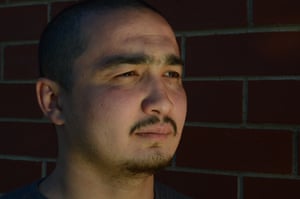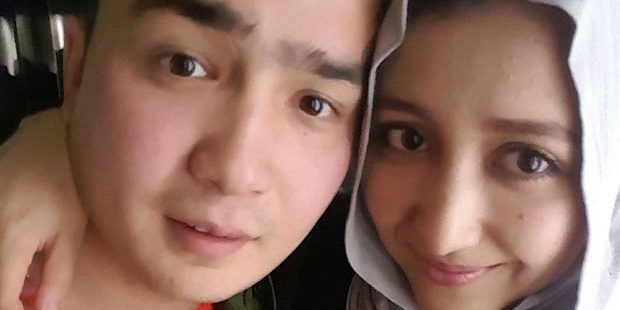High school sweethearts – both originally from China’s Xinjiang (East Turkistan) Uighur region – dreamed of living together in Australia
The last time Almas Nizamidin saw his wife was on Valentine’s Day last year, when he flew from Australia to China to surprise her. Now she’s in prison.
A month after his visit to China, his newly pregnant wife, Bizainafu Abudourexit, was caught up in a Chinese crackdown on the Uighur Muslim minority group, detained without charge, and sentenced to seven years in jail with no legal support.
Nizamidin had applied for a partnership visa for his wife to join him in Australia, but it wasn’t granted in time.
Nizamidin is now waging a lonely campaign as an Australian citizen to get his wife released from a Chinese women’s prison at a time when Australia is navigating a new relationship with China.
The high school sweethearts were torn apart geographically, and by force. Uighurs are a Sunni Muslim population of nearly 12 million people with Turkic origins living in the Xinjiang (East Turkistan) Uighur Autonomous Region.
Nizamidin left Urumqi in 2009, after his family urged him to move to Australia to escape violence soon after major riots in the region’s capital, Urumqi, left hundreds of Han Chinese and Uighur people dead. He was involved in the riots in his final year of high school.
Nearly a year since Abuourexiti’s arrest, Nizimidin sits in an Adelaide beachfront cafe twisting a ring he wears on his left hand as he talks. He says life had become “unbearable” in Urumqi before he left adding he had been banned from speaking his native language at school.
“It became like an open prison.”
He promised he’d return to marry Abuourexiti. “My parents mustered a large chunk of their savings to pay for my student visa to Australia – $40,000 – they could have bought a house for that in China.”
He arrived in Sydney with little English and no way to support himself. When he first arrived in Sydney he says the only person he knew was a friend of his father’s. Five months later he moved to Adelaide, with an Uighur community of 300 families. There he started work as a plasterer, and eventually picked up lucrative contracts in the construction sector.
I want to bring my wife here so she can feel what freedom is
In 2010, Nizamidin lodged an application for asylum in Australia. Even though he kept returning to Xinjiang (East Turkistan), he said he risked being detained or tortured. “I know it’s dangerous going back, but it’s love. I left on the promise I would return to marry her.”
In 2014 he became an Australian citizen and a year later he returned on an Australian passport to marry Abudourexiti.
She was detained on 29 March 2017, when she was on her way to a hospital to confirm the results of a home pregnancy test. Abudourexiti received a frenzied phone call from her mother saying Chinese police were at their family home demanding to speak to her. She was taken for questioning and hasn’t been seen since. No one knows what happened to her pregnancy.
Abudourexiti’s detention came during what human rights groups say were a wave of arrests of up to 10,000 Uighur people – taken without trial to either prison, or secret detention camps called “re-education camps” – for alleged political crimes ranging from extremist thoughts to travelling, or studying abroad.
Abudourexiti studied Islam in Cairo for two years, but returned to China and enrolled at university to study medicine.
The Australian government hasn’t pushed Beijing for her release, but says it raised concerns over the wider treatment of Uighur people in China. “The Australian government is concerned about the human rights situation in Xinjiang (East Turkistan) and has raised these concerns with relevant Chinese authorities,” an Australian Department of Foreign Affairs and Trade spokeswoman said.
Chinese authorities did not respond to questions on the detention of Abudourexiti.

Amnesty International called on the Chinese government to release her unless there was sufficient evidence that she committed an internationally recognised offence and is granted a fair trial in line with international standards. William Nee, China researcher at Amnesty, said the case was “absolutely tragic”.
“The Australian government should raise concerns about the ways in which Chinese detention practices in the region are seriously out of line with international laws and urge the Chinese government to clarify the legal situation of Buzainafu Abudourexiti.”
Nizamidin has fought a lonely battle to have his wife released, speaking to members of parliament, conventions in Europe, and next month is taking his protest to Canberra. He has spent $9,000 applying for a partnership visa and hiring migration consultants, but the partnership visa was declined on 7 February, on the grounds that a new police clearance was needed and she was not contactable as she was in prison.
Members of both of their immediate family have been arrested and detained in the past 10 years.
“I miss her so much. I want to bring my wife here so she can feel what freedom is,” Nizamidin sayd.
This story was amended on 27 February to clarify that Nizimidin said he had been banned from speaking his native language at school in Urumqi.







